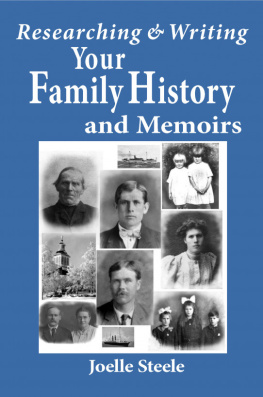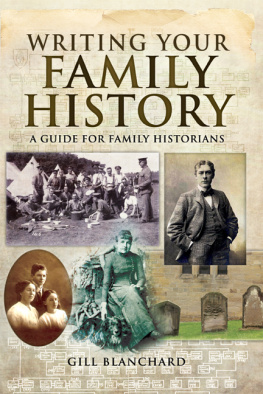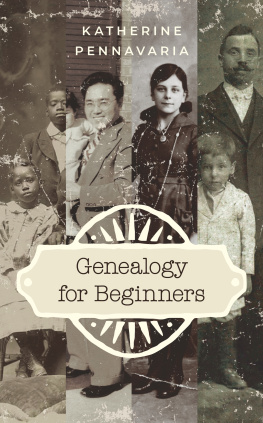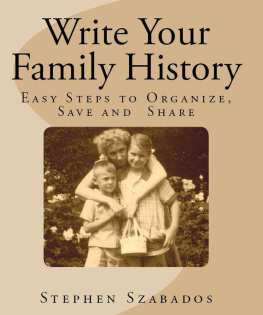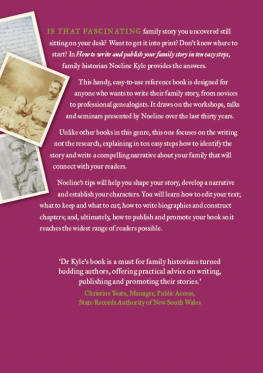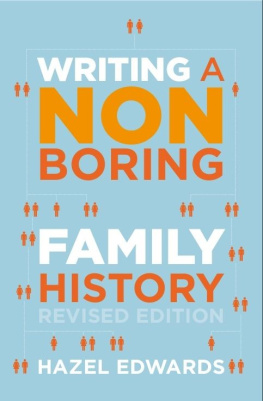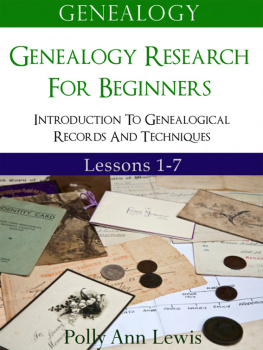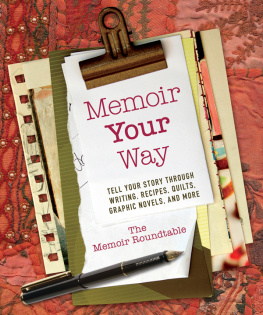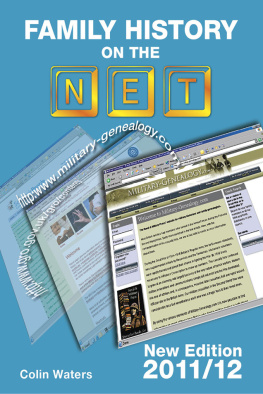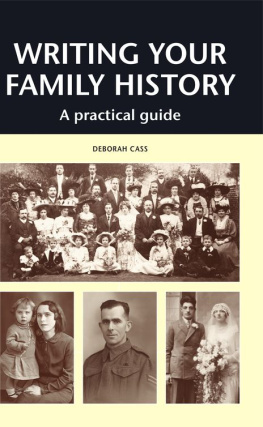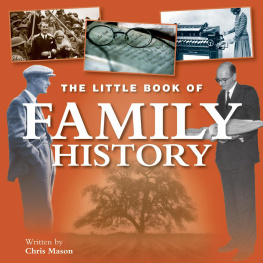Researching & WritingYour Family History and Memoirs
By Joelle Steele
Copyright Joelle Steele 2014
Published by Many Hats Publications/JoelleSteele Enterprises Publishing at Smashwords
Smashwords Edition,License Notes
This ebook is licensed foryour personal enjoyment only. This ebook may not be re-sold orgiven away to other people. If you would like to share this bookwith another person, please purchase an additional copy for eachrecipient. If you're reading this book and did not purchase it, orit was not purchased for your use only, then please return toSmashwords.com and purchase your own copy. Thank you for respectingthe hard work of this author.
Table of Contents
Genealogy is one of the most popularhobbies in America today. We have become fascinated withdiscovering our roots. After much painstaking research over periodsof years, we will, hopefully, end up with a completed family treeand an accompanying history.
But while those are great historical works intheir own right, they are also yet one more important demonstrationof how small and interconnected our planet really is. For example,in west central Finland are at least 300 people to whom I amrelated. I did not even know of their existence until I first beganmy genealogical search in 1985. And here in the United States,Ihave met about 60 people to whom I amrelated whose roots are in that very same part of Finland.
Knowing where you came from and who yourancestors were fills in what is otherwise a very huge gap in ourinterpretation of the word "family." We are the sum total of allthat has come before us, and when you begin to "meet" yourancestors through your research, this will become readily apparent.And, when you meet your long-lost distant cousins, you may bepleasantly surprised to find that you have a lot more in commonwith them than just your DNA.
While genealogy is fun, it is also detailed,challenging, and often difficult work that can take years tocomplete. But the rewards from all that work can be verysatisfying. When you take a look at your completed tree and see allthe many people it took to bring you into this world, and then lookat your family history and discover that you now know a lot aboutthose people, it can make you very humble and it can also make youvery proud.
The following is a brief guide to researchingand writing your family history. Be prepared to work hard at it,and at the same time, be prepared to have fun!
Joelle Steele
May 2014
Getting Organized
Before you even think about searching foryour ancestors, know that you will be dealing with a ton ofinformation and some of it will be conflicting, some will appear tobe irrelevant to your search, some will be for other lines in thesame tree, etc. Keep everything. Never throw any of it away, evenif you know it is not for your particular line of the family,because someone else may need it and you will be able to give it tothem after they have given you something you need. In other words,it is a good way to reciprocate in kind. Write in pencil on thebacks of these items why you think it isn't about your family andwhere you got it. Sometimes you think it isn't for your family andlater find out that it is.
You will probably have a combination ofcomputer files and paper files (especially official documents) foreach line, for each individual, or for whatever works best for you.Keep all your trees in separate files. Keep original documents in aseparate file or under sheet protectors in a binder with tabdividers for each person they pertain to. Keep maps, photos, andhistories (such as original stories, memoirs, or diaries) inseparate files. Carefully label everything on the back in pencil(not pen), making sure that you do not put glue or tape on top ofphotos or other valuable documents.
Make a cover sheet for each person you areresearching, showing alternate spellings of names (because you haveto search every alternative you can think of and you may find theperson you are looking for under a variety of names), addresseswhere they lived, churches they attended, names of their children(and variant spellings for the children's names), names of peoplewho knew them, notes on what they did in life (e.g., militaryservices, farmer in a particular county, attended a particularschool, owned a business, etc.), where they are buried, when theywere married or divorced, etc. On the back of that cover sheet, oron a separate attached blank sheet, make a list of all thequestions you need to get answered about this person.
Storing Your Family Data
You can't rely on a hand-drawn family treefor very long, because it is always growing and changing,especially during the initial research stages. Back in 1979,Istarted out using a hand-drawn tree onlarge sheets of graph paper that were all taped together. By 1989,it had grown into a seven-foot wide by four-foot tall tree thathung in my front hallway (the only wall big enough for it) forthree years as I constantly added to it, corrected it, scribblednotes on it, drew lines all over the place, etc. I finally investedin Family Tree Maker software. It is one of the most widely usedgenealogical software programs in the United States. Havinggenealogical software is really great, especially when you areexchanging data all over the world. There are other excellentprograms available too, but this one just happens to be myfavorite. Search the Web until you find something that works foryou. Here are, in order, what Family Tree Maker, Personal AncestralFile, and Brothers Keeper data entry screens look like.
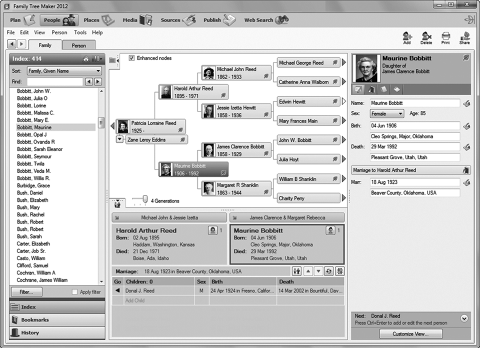
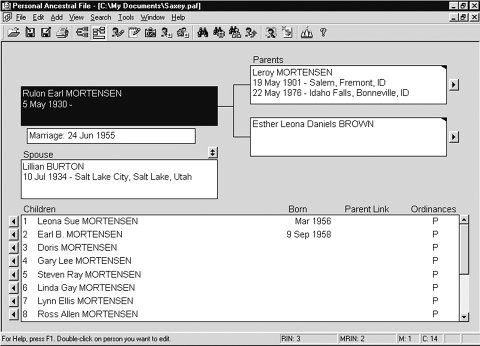
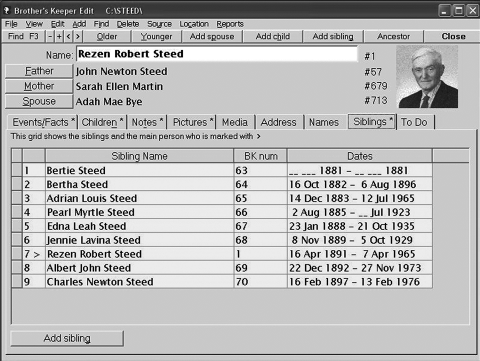
Researching With An Open Mind
Any form of research requires that you keepan open mind about anything and everything. If you don't, you maymiss a valuable piece of information along the way, or you may endup on a wild goose chase. Nowhere is this more true than in agenealogical search. So keep the following in mind as you research.Genealogical research is all about being a family detective. Youmust leave no stone unturned in your search for information. Youwill find that you become very resourceful as you learn to navigateall of the various sources for documents that help you tell thestory by giving you a better understanding of who did what andwhen.
Number one rule: always search for the TRUTH.Family stories are greater sources of inaccuracies than anythingelse. Perpetuating a family story that is nothing more than a lieis always a mistake. The true story is always going to be farbetter than the gossip and rumors that are passed on as historywhen they are sometimes completely untrue. This doesn't mean yourancestors are liars. Some stories are merely incomplete, told to achild in a manner that was "age appropriate" at the time and thenpassed on by the child who never knew there was anything else tothe story. Some stories are inaccurate because they have beenretold so many times and by so many different people that they havemissing pieces or have been unduly embellished. Here are twoexamples:
Story: When I was about 10 I asked why someof my cousins were called "half-cousins." My mother told me it wasbecause we had a different grandfather because their grandfatherhad died and our grandmother had remarried. I asked what happenedto their grandfather and my mother said he had died in a trainaccident. I assumed he was riding in a train that crashed.
Next page
